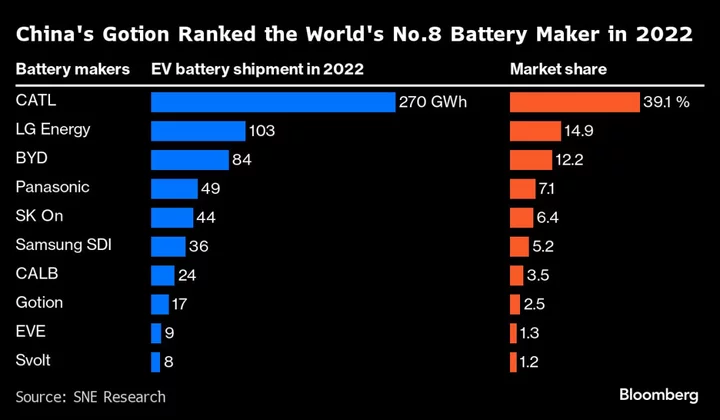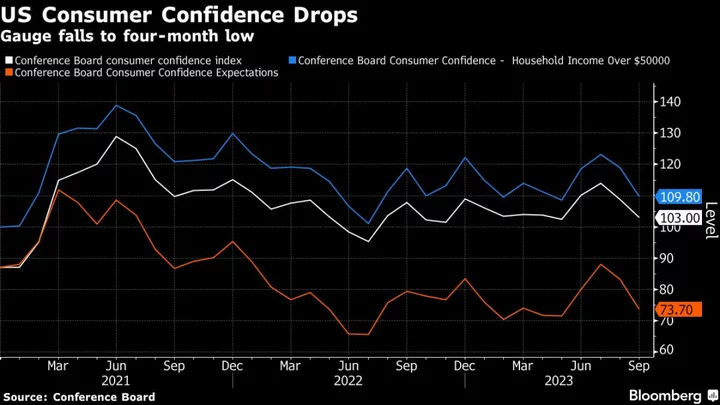Chinese investors are shifting more money into overseas assets as the Federal Reserve’s interest-rate hikes add allure to dollar deposits and bonds, putting pressure on slumping local stocks.
Outflows have been growing this year through two key channels that allow investors to buy assets abroad through licensed institutions. That’s straining regulatory quotas as local firms and onshore units of global giants like JPMorgan Chase & Co. and BlackRock Inc. race to tap the demand.
The issuance of Qualified Domestic Institutional Investor funds jumped to 26 this year as of June 13, poised to set a new half-year record, according to data compiled by Bloomberg. Banks launched 144 wealth management products in foreign currencies, mostly dollars, in the first four months, a surge of 177% from a year earlier, according to consultancy PY Standard.
The trend looks poised to gain more momentum as bond traders bet the Fed will keep interest rates high and Chinese policy makers cut short-term borrowing costs. More outflows would hurt the local stock market at a time when pessimism is deepening amid worries over economic growth and geopolitics.
Underpinning the trend has been a rare reversal in interest-rate differentials between the US and China. Investor speculation about looming cuts to China’s longer-term policy rates intensified on Tuesday after the central bank unexpectedly lowered its seven-day reverse repurchase rate.
The better performance of overseas markets has fueled solid demand, with a couple of fund managers releasing statements to suspend subscriptions due to possible quota shortages, according to Z-Ben Advisors Ltd. senior analyst Johnny Fang.
“Fund managers have noticed the demand for offshore securities investments, and want to launch products ahead of the competition to seize the opportunity,” Fang said.
China approved a total quota of $162.7 billion for QDII as of May 31, according to the latest official data.
China Asset Management Co.’s Hang Seng Internet and Information Tech ETF has imposed a daily cap on investor purchases. This year’s new subscriptions through June 8 reached the highest among equity-focused exchange-trade funds, draining its QDII quota quickly, the company said.
BlackRock’s wealth management unit has sold nine QDII products since March that mainly invest in overseas bank deposits, with the target annualized return as high as 4.95%, according to filings. In comparison, domestic wealth products with similar maturities — from three months to a year — sold by China Merchants Bank Co. typically offer less than 4%.
Many QDII products target offshore dollar bonds that have become more appealing after the Fed’s hikes pushed up coupon rates and last year’s price declines widened yields to maturity.
Some foreign asset managers are also raising money through the Qualified Domestic Limited Partner program to tap such dollar debts or other alternative assets like hedge funds, according to Ping An Bank Co., one of the largest distributors for QDLP products.
“Both the institutions and their clients have noticed those clear investment opportunities this year and the forex quotas are running down quickly,” said Zheng Dong, a Shanghai-based manager at the lender’s private banking department. “Even if the Fed starts to cut interest rates later, it will boost asset prices.”
The combined sales of products that target global markets like QDII and QDLP at Ping An Bank doubled to exceed $1 billion in the first quarter, he added.
JPMorgan Asset Management raised about 660 million yuan ($92 million) through a QDII product last month that will mainly invest in high-grade dollar bonds, money market funds and deposits. The prospectus touted its “good timing” as the Fed is expected to slow rate hikes with US inflation easing.
Read how slower inflation gives Fed room to pause rate hikes
Net securities outflows due to Chinese investors’ outbound portfolio investments hit a record $173 billion last year, according to the State Administration of Foreign Exchange. Outflows related to China traders’ net purchases of overseas bonds more than doubled to an unprecedented $125.5 billion.
“Essentially, the private sector has taken over the role of recycling China’s current account surplus from the sovereign sector,” said Ju Wang, head of Greater China FX and rates strategy at BNP Paribas SA, noting that the percentage of non-official external assets has surged from 29% in 2009 to 65% last year.
While onshore investors have typically had a home bias in the past and tended to buy Chinese names offshore when investing through the QDII program, they are gradually starting to “truly diversify,” buying global stocks and bonds, Desiree Wang, China country head at JPMorgan Asset Management, said in May.
“They are going to look for something that can diversify their risk to provide a more smooth, less volatile return stream,” she said.
--With assistance from Denise Wee and Helen Sun.









